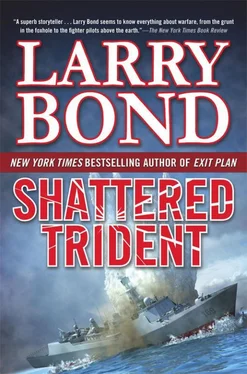“YES, COMMODORE! I DO DARE,” shouted Jerry just as loudly. “Your behavior is unprofessional and a disgrace! IF you are so convinced these orders are a disaster in the making, then show some courage and ask to be relieved! Otherwise, stop this passive-aggressive bullshit and do your job!”
Simonis sat back down, stunned; he was unaccustomed to subordinates fighting back. His jaw was tight, his fists balled, he was visibly shaking. “And what makes you so damn sure this will work? How do you know you’re right!?” he growled through clenched teeth.
“How do I know it will work, Commodore?” replied Jerry with a lower, less adversarial tone. “Honestly, I don’t know. But in looking at the president’s likely options, it seems to be the path with the least risk.”
“Least risk!?” Simonis wailed. “You obviously don’t see the big picture, Captain. The least risk is for us to remain neutral. Stay out of the fight completely!”
“Is that really true, Commodore?” pushed Jerry. “Let’s analyze that hypothesis. Staying neutral all but ensures the fighting goes on for a whole lot longer. Eventually, China will likely win, but their economy will be down the toilet. This will cause a global economic meltdown as bad, or conceivably even worse, than the Great Depression of the 1930s, that will drag us down as well. Just look at the economic impact the war has already had on the U.S. and Europe. A collapse is unavoidable; our economies are too interconnected. Every newspaper article and official government report I’ve read all say the same thing—unprecedented unemployment, soaring poverty, and the government safety net can’t possibly catch them all.
“Politically, the U.S. will be viewed as untrustworthy. At the very least we’ll be pushed out of the Pacific Rim, because we refused to honor our treaty commitments. I know that doesn’t make a whole lot of sense, but the blame game isn’t exactly logical. We’ll be blamed for their loss, even though the Littoral Alliance rejected the president’s repeated attempts at mediation. This will also raise doubts with other countries as to whether we’ll honor our security agreements with them. Coupled with our own economic problems, U.S. influence will be severely compromised.
“And I haven’t even begun to address the humanitarian disaster this war will cause if it continues. Every continent will be affected, some far worse than others. Definitely China and the Littoral Alliance will suffer more civilian casualties, but the impact on developing nations following the economic collapse will be catastrophic.
“No, sir. The bigger picture painted by staying neutral is dismal, even if we ignore the significant loss of life, worldwide, this war will cause. The U.S. will emerge from it fiscally broke, politically feeble, a superpower in military terms only. Which is why the president has already chosen not to adopt that strategy, you know this better than I. PACOM has already started implementing major parts of OPLAN 5077. Come tomorrow, one way or another, my boat leaves for war.
“So, either we shock the crap out of both the Chinese and the alliance, get them to see the oncoming train wreck, or we start shooting Chinese targets. And once we push their back up against the wall, the Chinese will feel compelled to resort to a nuclear demonstration to stave off defeat. That’s when a city or two will be vaporized. They may not be ours, but that distinction won’t matter a whole hell of a lot. After that, things will go downhill really fast.”
“I don’t buy the use of nuclear weapons, period, Mitchell,” said Simonis, still strained. “It is too easy to misinterpret the message we’re trying to send.”
“I’m not saying there isn’t any risk, Commodore,” argued Jerry. “All I’m saying is that the risk of a preemptive demonstration out in the middle of the ocean is lower than escalation to the point where nuclear weapons are used against an actual target.
“Think about it. There really is very little to misinterpret. The first warning the Littoral Alliance and China will have is when the warheads detonate. They’ll know they went off, and they’ll know they went off far from their homelands. That’s why our squadron got tasked with this mission; we’ve got the stealth and the weapons to pull it off. This has to be a bolt out of the frickin’ blue, no warning, just a lot of big bangs that will shock the living daylights outta them, hopefully enough to bring everyone to their senses.”
Simonis didn’t respond immediately. He just sat there, his mind working its way through Jerry’s explanation. On the plus side, the crimson hue had drained from the commodore’s face and his hands were no longer clenched tight. After nearly a minute of silence, Simonis took a deep breath; he seemed calmer, but his voice was still tense as he spoke. “Thank you for your explanation, Captain. I’m still not completely convinced this is the right thing to do, but I now see there is some logic behind it. I must admit that I’m greatly concerned about the possibility of a Chinese retaliation. This island makes for a splendid demonstration target.”
Jerry smiled weakly. “The thought had occurred to me as well, sir. I just didn’t think it would be very constructive for me to bring it up.”
“You’re correct, it wouldn’t,” replied Simonis sternly. “I have a lot of people and their families here, Captain, and I’m responsible for their welfare. It’s difficult for me to watch this situation as it deteriorates, and know that I have absolutely no control over what’s going on. It’s not a pleasant feeling being helpless.”
“I completely understand, sir. I believe that was the point you had to ram down my throat earlier.” Jerry grinned as he spoke. To his relief, Simonis broke out laughing.
“I guess I’d make a rather poor psychiatrist. Beating one’s patients about the head and shoulders is usually frowned upon.”
“Well, I can certainly vouch for the effectiveness of the treatment,” Jerry said with a wink. “But your bedside manner could use some work.”
Simonis smiled as he nodded. “Got it. I’ll make sure it’s on my next counseling form.”
Rising, the commodore extended his hand to Jerry, who grasped it firmly. “I expect you and your crew to carry out your assignment flawlessly, Captain,” remarked Simonis firmly.
“Understood, sir. I’ll try not to disappoint you.”
“I know you won’t, Captain.”
14 September 2016
1930 Local Time
Andersen Air Force Base
Guam
Simonis watched as the C-17 Globemaster III transport aircraft pulled up to the hangar. The immediate location was swarming with air force security personnel. The roads to the submarine piers had been closed to civilian traffic, and marines lined the entire route. Security was so tight, one would have thought the president of the United States was coming for a visit.
As the aircraft’s turbine engines wound down, the cargo ramp began lowering; more security personnel jumped out of the back of the aircraft and quickly set up a perimeter. Marine guards ran forward with the trucks as they moved into position to receive the “special torpedoes.” Soon Simonis saw the forward crew door open. The access ladder extended out and reached for the tarmac. Once the ladder was down, Dr. Patterson emerged from the airplane along with a small entourage. Simonis walked briskly up to meet her.
“Welcome back to Guam, Dr. Patterson.”
“Thank you, Captain,” she replied. Joanna then pointed to the two officers accompanying her. “Captain Simonis, this is Colonel Thomas and Chief Warrant Officer Four Harris, they’re in charge of preparing and supervising the loading of the weapons. Gentlemen, Captain Simonis is the commodore of Submarine Squadron Fifteen.”
Читать дальше

![Никки Сикс - Героиновые дневники. Год из жизни павшей рок-звезды[The Heroin Diaries - A Year in the Life of a Shattered Rock Star]](/books/78612/nikki-siks-geroinovye-dnevniki-god-iz-zhizni-pavshej-rok-zvezdy-the-heroin-diaries-a-yea-thumb.webp)










